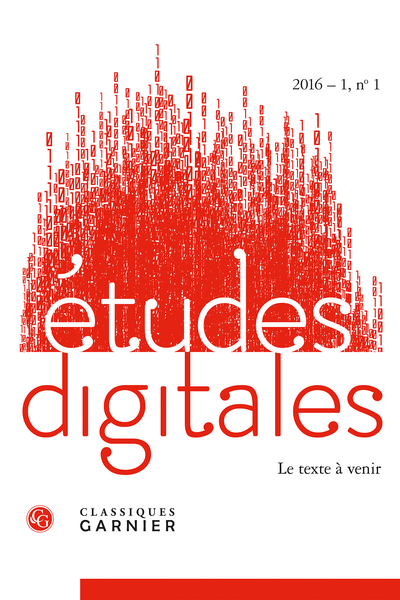
« The task of digital studies »
- Type de publication : Article de revue
- Revue : Études digitales
2016 – 1, n° 1. Le texte à venir - Auteur : Moore (Gerald)
- Pages : 265 à 266
- Revue : Études digitales
- Thème CLIL : 3157 -- SCIENCES HUMAINES ET SOCIALES, LETTRES -- Lettres et Sciences du langage -- Sciences de l'information et de la communication
- EAN : 9782406061939
- ISBN : 978-2-406-06193-9
- ISSN : 2497-1650
- DOI : 10.15122/isbn.978-2-406-06193-9.p.0265
- Éditeur : Classiques Garnier
- Mise en ligne : 29/09/2016
- Périodicité : Semestrielle
- Langue : Anglais
« The task of digital studies »
After the revolutions of Neolithic agriculture and Enlightenment industry, the Digital Revolution constitutes the “third” great cultural shift of human history (Rifkin 2013), or even of an expanded Anthropocene, understood to have begun when our artificial selection of the Pleistocene megafauna triggered the Quaternary extinction event (Doughty, et al. 2010: 1). But deriving from digitus, or finger, the organ through which we manipulate tools, digital studies moreover pertains to the study of technical objects and their relationship with the humans who use them; to the cultural constitution of our species through the acquired experience of our ancestors, which is ratcheted up in the tools we use to carve ourselves out a future.
The Digital Age may well be the last great revolution before we go the way of the Neanderthals, who arguably succumbed to a breakdown in the transmission of culturally accumulated experience. Anticipating a future that also has also been predicted for us(Lovelock 2006: 202-3), our last hominin ancestors may have died out when increasingly fragmented, environmentally isolated populations were unable to sustain the division of specialised labour, or tool-use, characteristic of Neanderthal society. The imperative of survival meant the young were called to use tools for which they were not adequately trained. Unable to access the ancestral knowledge locked up in their inherited technical objects, they could not modify them in the face of new environmental challenges and died out (Sterelny 2012: 65-8).
Far beyond the scope of mere “numerics”, this fate is raised by the consumer lock-in that reduces us to hyperspecialist, passive consumers of technology. It might be mitigated by a concerted effort to expand the horizons opened up by our contemporary tool-use. This is the task of digital studies, construed as both the study of culture and its 266relation, through tools, to redemption; and as a prescriptive call for the reinvention of tool-led agency.
Gerald Moore
Durham University